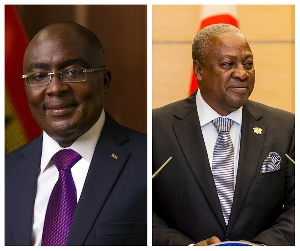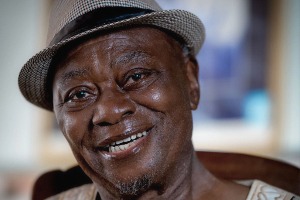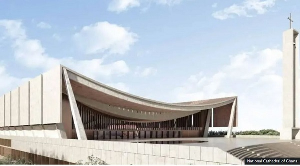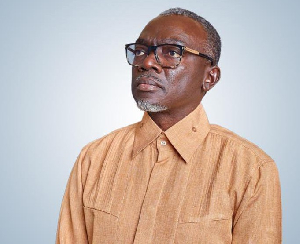Please reflect on four key questions regarding Ghana’s future after the 2024 elections as we evaluate the worth of John Dramani Mahama and Dr. Mahamudu Bawumia’s manifesto. First; what are the main challenges of Ghana’s economy? Second, what are the realistic solutions to the challenges? Third, what is Mahama’s manifesto credibility and the NDC record and Bawumia’s manifesto credibility and the NPP record? Lastly, we must clarify whether Bawumia or Mahama have varying solutions or are essentially similar in policy direction.
To roll on, we can categorize Ghana’s economic challenges into five: poor earnings from enormous minerals and agricultural produce, corruption, low industrial growth, inadequate infrastructure and amenities, and external monetary exploitation.
Let us start with corruption, we must start here because if you hand over a super-power economy to cliques of corrupt politicians, that economy will be crushed overnight. So, no matter how well we are doing, if we keep pouring water into a bucket, we will end up with nothing. Any serious leader has a hatred for corruption, the kind of hatred that is hard to find in Mahama and Bawumia because they are even alleged as the mother ‘serpent’ and the ‘mate’ of corruption.
Thus, we expect they will take a strong stance against corruption in their campaign for the high office. Even the individual has an everyday task to check his or her corrupt desires. Corruption must therefore be ruthlessly fought tooth
and nail if a president wishes to lead a productive government in this country. Mahama’s manifesto largely indicates a will to go after NPP vigilantes infiltrating state security, and NPP state-grabbing policies over the years without presenting a mid-term policy to deal with corruption. The best we get
from Mahama is his will to pass a bill to prohibit all government appointees from procuring state assets.
Bawumia has demonstrated no will nor urgency for his government to take serious measures against corruption at all in his 2024 manifesto. He obviously doesn’t prioritize the fight against corruption and assumes that by digitization of public transactions and services, we will agree that he is eliminating corruption. Of course, digitization is a step forward toward some solutions but it must be seriously backed with a draconian penal system. Real human beings will be pushing buttons in our Ghana world. For instance, police in Ghana can begin the ticket system, but as they deal with real human beings (say drivers) unchecked, they can still keep up the extortion.
How do we deal with kickbacks, off-the-book transactions, biased contract awards, etc? Even the senior high school placement system which is supposed to be digitized, has special placement and big men extorting millions from parents to place their wards in schools they don’t qualify for. Thus, an agency that must monitor, spy on, and hunt all corrupt public servants across the various levels of government must be created and mandated to independently investigate and ruthlessly punish the corrupt. We bear witness to the success of non-state actors like Anas Aremeyaw Anas' usage of clandestine setup to expose corrupt officials.
An agency with a public mandate, codes of procedure, ranges of corrupt acts, and their corresponding punishment can carry out clandestine operations to check public servants involved in corruption. There can be other creative approaches, but the point is that a serious president of Ghana will be thinking out of the box on ways to purge corrupt fellow cabinet members and corruption among civil servants if he or she genuinely wishes to implement revolutionary policies.
Taxation Burden and Foreign Exploitation:
Secondly, our nation though prided with rich mineral resources, the government makes lesser revenue from them compared to tax revenue. Tax has become the only medium used to increase government revenue. Both the NPP and NDC governments have adopted numerous strategies to increase taxes on the people of Ghana but have done little to reap fair earnings from our rich minerals at the disposal of
foreign investors. Ghana Mineral Commission laws permit foreign companies to hold shares up to 90% in mineral concessions. The dogmatic approach to increasing private sector activities has led to policies that allow foreigners to exploit Ghanaians. Capital flight is high in Ghana and the U.S. dollar continues to rise against the Ghana cedi.
Ghana oil has been taken over by Cosmos and Tullow, indebtedness and debt repayment to IMF cripples Ghana government economic activities both internally and externally. These are issues of foreign exploitation. Every major mineral deposit in Ghana is controlled by foreigners; with usually 80% to 90% shares. Since 1966, the IMF began pushing Ghana to devalue its currency, privatize state assets, and dilute laws on foreign investors. Thus, foreign companies are
making billions from Ghana monthly through debt repayment, resource extractions, cedi depreciation, and profit repatriation. Mahama and Bawumia are silent on this key problem. The victory in resource control; which we achieved at independence has been set back. Foreigners control Ghana’s resources.
Why have Bawumia and Mahama failed to see this? Because their parties are clandestinely funded by some of these companies, such selfish transaction is a win for the foreigners and the party leaders and a loss to the poor Ghanaian masses. Mahama or Bawumia will dare not to talk about foreign companies holding lion shares in resources like our oil and Gold, they will dare not talk against IMF conditionalities.
Ask yourself why IMF keeps giving loans to our leadership despite our crippled economy to put us into more debt? Ask again, what IMF loans have been used to achieve? The ruling parties are getting funded with foreign currency and Ghanaians pay the price with increasing concessions in favor of IMF subsidiaries. The fact that both Mahama and Bawumia will not speak about foreign exploitation is evidence that they are not willing to take any risk for Ghanaians. They will fail us, trust me. The master plan is taxing the poor Ghanaian masses.
Infrastructure and Social Amenities:
Equipment for sanitation, roads, street lights, public building facilities, sewage facilities, water supply facilities, and energy production facilities are among the major infrastructural challenges in Ghana. They are inadequate to meet the country’s needs and symbolic evidence of our low development. Each of
these categories of infrastructure can be gradually developed simultaneously. But the realistic solution is to target one sector at a time where the majority of resources will be allocated to root out the problem faced in that sector nationwide. Both the NPP and NDC administrations over the years pay lip service to infrastructural development.
Getting a few of some infrastructural needs during an election year to have
a campaign message. They have no long-term or medium-term goal of solving the infrastructural crisis in Ghana. Both Mahama and Bawumia have failed to specify any category of infrastructure they will prioritize and eliminate its challenges nationwide. They are unwilling to be specific, for Ghanaians to hold them accountable if they fail to deliver. We should expect that ‘dumsor’ will intensify again whether under Mahama or Bawumia. They are part both going to play the role of paying lip services to the infrastructural crisis in Ghana without any long-term plan.
Low Industrial Growth:
If we review the economic history of capitalist states like the UK, the U.S., and Japan, we get a different story on their industrial takeoff. All these economies industrialized through active state interventions: the laws to operate within, the sponsorship and deals with even private industries, and the erection of state corporations until their diversification at a point. In Ghana, we are bombarded with a different narrative by the NPP and NDC, we want to have private sector-led industrial growth and we end up giving up production sectors to be hijacked by foreign companies; that are unwilling to set up industries
here because they find it more profitable to export their goods to us than to bring their jobs to us.
Now, Ghana like several African countries has few industries to meet the needs and tastes of the population, we are increasingly consuming and not producing enough, which directly causes unemployment, low GDP, balance of trade deficit, weak currency, and high cost of living. So long as we remain a population
that consumes more than it produces, the above problems will remain, regardless of the economic strategies we adopt. We must produce the population's needs internally or produce goods with greater value on the world market that can finance the purchase of external goods to feed the population’s needs. Local industries must therefore be the priority of any trustworthy presidential candidate. Shamefully Bawumia does not even remember processing industry in his manifesto. The country is not only failing to produce its industrial needs but also increasing the import of agricultural goods.
Manifesto Summary:
The NDC 2024 manifesto in summary promises to reduce the tax burden on the population while increasing government expenses on social intervention measures. Mahama promises to scrap about five e-taxes, introduce free tertiary education for disabled and first-year students, and revitalize the textile, sugar, meat, and tomato industries. If we pay careful attention, Mahama’s campaign manifesto appeals to the broader wishes of the population without any genuine clue on how they will deliver. The manifesto only promises to reduce tax revenue and increase government expenses on social policies.
This is dangerous, and not different from the current NPP administration; which promised to reduce taxes but rather increased taxes to be able to run this so-called free SHS policy program. either Mahama is lying to Ghanaians or going to increase the cost of living and taxes to meet them. Apart from taxation,
the Mahama we know is not going to find other creative avenues to raise state revenue for state industry. We shouldn’t forget that the NDC led the divestiture policy that caused a lot of state enterprises to be privatized under Rawlings.
Bawumia promises tax amnesty for a fresh tax system, digitizing tax transactions and administration, reducing the cost of transport and fuel, introducing electric vehicles, one district one hospital, and generally continuing agenda 111. It is hard to believe him in these areas when apart from the digitization of taxes his government failed Ghanaians in all these areas. Bawumia’s 2024 manifesto is uniquely concerned about digitization and that seems to be the only promising side of his campaign but he has more tendency to privatization with little interventionist policy. This may improve the service sector in Ghana but it does not necessarily confront the major problems we earlier acknowledged.
Common Themes and Common Lies:
Both are promising affirmative action for women and IT training of thousands of youths for employment but lack a realistic approach to deal with unemployment in Ghana. There are no cheap solutions. We consume more than we produce, a state-led approach to cutting imports and increasing internal food production and manufacturing goods is essential but deals with EPA and foreign pressures have turned Ghana into the dumping ground of developed economies. Mahama and Bawumia love whites so much that they will not start fighting foreign exploitation and the need for Ghana’s economic sovereignty.
Again, in the 2024 manifesto, both promise to reduce the tax burden in Ghana. we must be well aware that without specifying an alternative means to increase government revenue and stabilize the cedi, they are lying to Ghanaians about tax reduction and inflation control. On education, back in 2016, it was Mahama campaigning for education facilities before we made secondary schools free while Nana Addo was campaigning for free SHS, now the tables have turned, and Bawumia is promising to increase tertiary education facilities but Mahama is campaigning for partial free tertiary education.
This is hypocrisy on both sides if you consider their argument then and now. On value for money, Bawumia is promising to cut down the number of ministers to 50 while Mahama is promising to scrap ex gratia. Mahama did not scrap Ex gratia when he had all the power and Bawumia is second in command for a government that
historically increased the number of state ministers to 110. They must take Ghanaians for fools for thinking we don’t know they are lying to us. Historically within their parties and personally; both agree on the privatization of state assets and increasing the role of the private sector. Thus, both NPP and NDC have no serious intention of state-led industrial projects to strengthen national control of Ghana’s economy.
Both Mahama and Bawumia consider securing IMF and other foreign loans, thus silent on the issue of national debt. They are both okay with IMF directives to dictate the fundamentals and future of Ghana’s economy and are more likely to increase the indebtedness of Ghana when they become heads of state. Both are willing to continue the current resource and mineral deals that allow foreign multinational companies to fly out with Ghana’s mineral and oil wealth while paying Ghanaians penniless.
Both are corrupt and partisan and both pay lip service to the infrastructural development of Ghana. Clearly when it comes to the economic policy direction, both the NPP and NDC are essentially the same. They do not have any clear difference in economic direction or policy alternatives. We cannot associate a specific policy direction with one of them against the other for clearly, they are pro-foreign intervention in Ghana’s economy and foreign companies' control over our major resources, private sector-led wealth creation, and wealth control. This means that there is a critical need for a party with different political alternatives and directions to emerge. Should the NPP or NDC presidential candidates win the 2024 election; national debt will keep up, cedi devaluation will continue, slow industrial growth, the balance of payment deficit, inflation, and foreign control of our economy among other tragic economic trends will continue.
Opinions of Tuesday, 10 September 2024
Columnist: Arhin Otoo



















